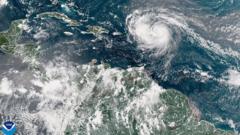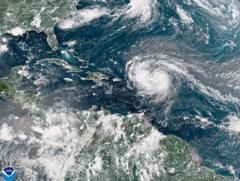As diplomats gather at the COP29 summit in Baku, the impending return of Donald Trump looms large, threatening U.S. commitments to climate agreements and complicating global climate efforts.
U.S. Elections Cast Shadow Over COP29 Climate Talks in Azerbaijan

U.S. Elections Cast Shadow Over COP29 Climate Talks in Azerbaijan
Global leaders confront challenges posed by the potential impacts of a Trump presidency on climate action.
Diplomats from across the globe have convened in Baku, Azerbaijan, to discuss urgent financial strategies for combating climate change at the COP29 summit. However, a prominent topic overshadowing these discussions is the outcome of the recent U.S. elections, particularly the anticipated return of Donald J. Trump to the presidency.
With Mr. Trump expected to reverse critical climate policies and potentially withdraw from the Paris climate agreement upon taking office in January, world leaders find themselves grappling with the loss of cohesive support from one of the richest nations historically instrumental in global warming discussions. Concerns loom about how to maintain momentum in climate negotiations without the U.S. actively engaged in its commitments to reducing greenhouse gas emissions.
In an attempt to sustain morale among participants, Yalchin Rafiyev, Azerbaijan’s deputy foreign minister and COP29 lead negotiator, emphasized the shared responsibility of all nations in battling climate change. “Success does not depend on one country alone — it depends on all of us,” he stated amid the growing apprehension.
The summit initially aimed at exploring vital financing options for climate action now must contend with the uncertainty introduced by U.S. politics, prompting questions about future initiatives in the face of shifting international alliances and policies.






















